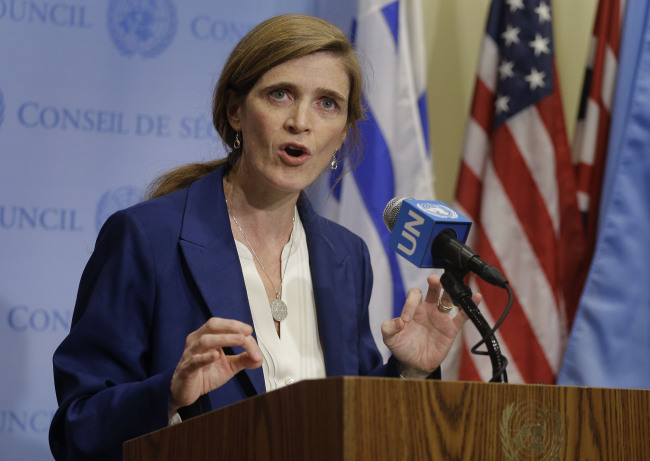The U.N. Security Council is pushing for mandatory cargo inspections, comprehensive arms embargo and a limited ban on mineral exports in the latest bout of measures designed to tighten its sanctions on North Korea over its latest nuclear and missile tests.
Following nearly two months of grueling negotiations between Washington and Beijing, U.S. Ambassador to the U.N. Samantha Power presented a draft resolution on Thursday in New York. After circulating it to all 15 member states, the council is expected to adopt the resolution over the weekend.
“It is a major upgrade and there will be — provided it goes forward — pressure on more points, tougher, more comprehensive, more sectors. It’s breaking new ground in a whole host of ways,” Power said ahead of circulating the text at a closed-door meeting.
The document carries “the strongest set of sanctions imposed by the Security Council in more than two decades,” she told reporters afterward.
 |
| U.S. Ambassador to the United Nations Samantha Power (Yonhap) |
Seoul, which has joined hands with Washington to call for a “terminating” resolution, also lauded it as “unprecedentedly strong and effective,” expressing hopes for a swift passage.
Under the proposal, all U.N. member states would be required to carry out inspections on all shipment passing through their waters to or from North Korea to see if any illicit items are loaded. This marks an upgrade compared with the past when they were obliged to do so only if they had related grounds. Likewise, it would forbid all flights suspected of carrying prohibited items.
Also for the first time, it calls for an embargo on the exports of coal, iron, gold, titanium, rare earth minerals and other minerals except for “livelihood purposes,” in another move to squeeze funding sources for the communist state’s nuclear and missile program.
The existing small and light arms trade ban would be tightened to cover all weapons, while a new one could be enforced to bar the transfer of any items that may directly help improve the North Korean armed forces’ operational capabilities.
On finance, the document would require — an advancement from “encourage” — countries to freeze the assets of any North Korean state or ruling Workers’ Party organs involved in banned activities. North Korean banks would be blocked from opening branches abroad and hosting the offices and subsidiaries of other member states’ financial institutions.
It also seeks to expand the council’s blacklist by adding 12 entities and 17 individuals including the National Aerospace Development Agency that was in charge of the Feb. 7 long-range rocket firing. An annex to the resolution newly lists 31 ships to be boycotted, all owned by the North’s Ocean Maritime Management Company Ltd.
Other suggestions include a sanction on all supplies of jet and rocket fuel and a mandate to oust North Korean diplomats engaged in unlawful activities.
“The resolution would send the international community’s united, stern message that it will not accept North Korea’s nuclear, missile and other weapons of mass destruction and their proliferation,” a senior official at South Korea’s Foreign Ministry told reporters on customary condition of anonymity.
“Once passed, it would hinder the North’s further acquisition of funds, weapons advancement technologies and know-how, thus complicating its nuclear development.
“And it’s important that it does not target the North Korean people … but one of the world’s most oppressive regimes alone.”
The Unification Ministry took notice in particular of the mineral trade ban, noting that exports of resources make up more than 40 percent of the North’s total trade volume.
“If passed, it would pose a substantial hurdle for its foreign currency income,” ministry spokesman Jeong Joon-hee said at a news briefing on Friday, adding that the government will explore further individual measures as a follow-up action.
The draft’s unusual unveiling came one day after U.S. National Security Advisor Susan Rice and Chinese Foreign Minister Wang Yi said they have agreed “on the importance of a strong and united international response to North Korea’s provocations,” according to a statement from the National Security Council.
Though Beijing remains Pyongyang’s top diplomatic and economic sponsor, the Kim Jong-un regime’s unabated, flagrant defiance of resolutions — and its own carrots and sticks — had apparently placed China in a thorny position in which endorsing tougher penalty was inevitable.
“We are opposed to any nuclear testing and the launch testing of ballistic missile technology and we hope this resolution will help to prevent further occurrences of this nature,” Chinese Ambassador Liu Jieyi said after the UNSC session.
The White House, for its part, praised Beijing’s cooperation, saying the draft is the proceeds of “extensive” conversations between the sides.
“I do think that it is indicative of how productive diplomacy can be. It’s not easy, but it certainly is an indication that the United States and China, when our interests are aligned, can cooperate quite effectively to advance the interests of citizens in both our countries,” spokesman Josh Earnest said during a daily briefing on Thursday.
By Shin Hyon-hee (heeshin@heraldcorp.com)

